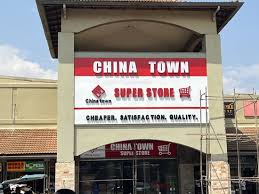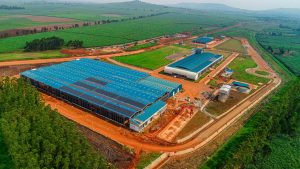
OutToLunch: China Town: Protectionism and partnerships critical for African economies
OutToLunch: China Town: Protectionism and partnerships critical for African economies By Denis Jjuuko China Town, a retail shop, in Lugogo without placing a single advert became the talk of town providing invaluable lessons for advertising and marketing executives. Shoppers looking for bargain deals claimed to have queued up from morning and left when the shop closed without having even stepped into the store. In March 2023, I wrote about China Square in Nairobi that was giving Kenyan traders sleepless nights while making consumers happy. Obviously, we may not have paid attention as a country until a company with a similar name showed up. I have heard that they are similar China something everywhere on the continent, selling stuff at laughable prices. At 1.4 billion people, Africa has a huge population that needs goods and services and even though it is the poorest continent, the volumes businesses can push cannot be entirely ignored. That is why retailers like China Town, China Square, China Mall and a plethora of others are here. Their model is the same—lower prices than elsewhere. I hope that they are selling high quality goods that have passed the tests of Uganda National Bureau of Standards (UNBS). Many traders are worried that their business models are being disrupted and their enterprises will collapse. They claim that they can’t compete anymore. That could be true. The Chinese are probably enjoying incentives from their home governments. The more products sold in consumer markets; the more days factories remain open in the producer markets. The more days factories remain open, the more people remain employed. The more taxes governments in producer markets earn. And the entire value chain is huge. Of course, these shops may not always sell imported products. Some may be locally made. The owners of such shops may approach manufacturers and sign contracts that give them lots of stuff in bulk at low rates. If a manufacturer is guaranteed a market at a certain price, they can be able to supply and remain in business. With better experiences, technologies, capital, systems and structures, these retailers may become very hard for local businesses to compete. So what countries usually do is that they decide to protect their businesses. The Americans have imposed high taxes on electric vehicles not made in the US because they know that Chinese automakers would make the likes of Tesla collapse or see a significant chunk of their revenue shrink. They have also imposed bans on some Chinese smartphones like Huawei. They have been toying with the idea of banning TikTok, the popular addictive video streaming app. The Chinese also banned American apps, which enabled their messaging apps like WeChat and Weibo become so big in China. The Europeans do the same. They have provided huge subsidies for their agricultural sector. In France, if you own a cow, you get an annual subsidy of EUR280 (Shs1.16m) annually. If you add in subsidies on land and other incentives, the farmer is in business. That also means that a farmer elsewhere can’t easily penetrate that market. There are also restrictions on importing beef and dairy products. In Africa, South Africa has some of the continent’s biggest assembling plants for cars. To protect them, South Africa doesn’t allow the importation of vehicles at their end of life from Japan or elsewhere. In fact, they don’t allow you to import any used vehicles. You can only import a brand new car which is not made in South Africa. Basically, you can only import Ferraris, Lamborghinis, Rolls Royces and such other luxury brands. They impose hefty import duties on them as well. They know that if they allow anyone to import any car they want, the auto industry will die. Uganda needs to put in place some protection policies and implement them. If Kiira Motors is making buses in Jinja, then they should not allow the importation of buses from anywhere else. You either buy the bus made in Uganda or forget about it. If there are people making household electronics in Kampala’s industrial area or Kapeeka, then others should not be imported. That way the guy who set up his plant can keep their factory open. Of course, UNBS would have to double down on its quality inspection protocols so that they ensure that only products of highest standards are made and supplied. Government would have to nip corruption in the bud for this to take place. However, in a globalized world, foreign investment cannot be fully eliminated especially in poor and transitioning economies. Global retailers and businesses would have to set up shop. Ensure that these global businesses are in partnership with local entrepreneurs that way they can learn a thing or two and will remain even if the foreigner decides to go. There will also be some capital that won’t be evacuated. The writer is a communication and visibility consultant. djjuuko@gmail.com


